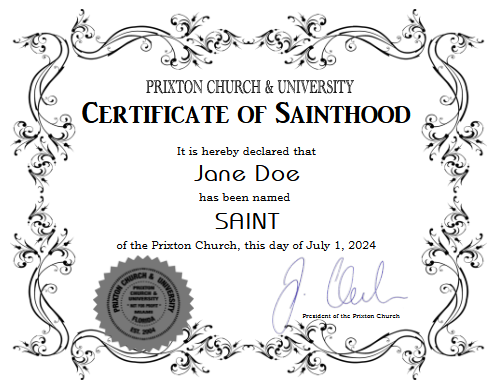
Buy Sainthood Certificate
12.50 Euro
Welcome to canonization. Buy your Sainthood Certificate (Canonization) here. Or you can buy the Canonization Certificate and give it as a gift. At other churches, a canonization sometimes costs $50,000 US dollars or more. Not at Prixton Church. We are officially licensed.

Sainthood: An Exploration of Holiness and Recognition
Sainthood is a profound subject that encapsulates the recognition of individuals who, through their lives and actions, exemplify extraordinary virtue, holiness, and devotion to God. This phenomenon is particularly prominent within various religious traditions, notably within Christianity, where the process and implications of canonization lead to the formal acknowledgment of a saint. This essay seeks to examine the theological, historical, and cultural facets of sainthood, elucidating its significance in the spiritual landscape and societal context.
Theological Foundations of Sainthood
At its core, sainthood reflects a belief in the communion of saints — a concept that stresses the interconnectedness of all believers, both living and deceased. This understanding is based on the notion that certain individuals, through their exemplary lives, have attained a level of holiness that makes them worthy of recognition and veneration by the community of believers.
The criteria for sainthood can vary among different denominations. However, common elements include a life of heroic virtue, martyrdom, or significant contributions to the faith. The canonization process, particularly within the Catholic Church, involves thorough investigations into the individual's life, miracles attributed to them posthumously, and formal declarations by the Pope, culminating in their elevation to sainthood.
Cultural Significance of Sainthood
In addition to its theological and historical aspects, sainthood holds considerable cultural importance. Saints often serve as moral exemplars within communities, providing models for ethical behavior and spiritual aspirations. The stories of saints frequently intertwine with local customs, folklore, and traditions, making them pivotal figures in cultural identity and heritage.
Sainthood: Challenges and Controversies
Despite the reverence associated with sainthood, the practice is not without challenges and controversies. The criteria for recognition may raise questions of inclusivity and representation, particularly regarding figures from non-Western cultures or marginalized communities. Furthermore, the existence of controversial saints — whose lives or teachings may be at odds with contemporary values — can provoke debates about the deliberation of sainthood and the qualities deemed virtuous.
In recent years, discussions surrounding the re-evaluation of certain saints' legacies illustrate the dynamic nature of how societies perceive holiness. For example, figures such as Junipero Serra, now recognized as a saint, have sparked dialogues about colonialism, cultural appropriation, and the complexities of historical narratives. These discussions underscore the necessity for an evolving understanding of sainthood that resonates with justice and equity.
